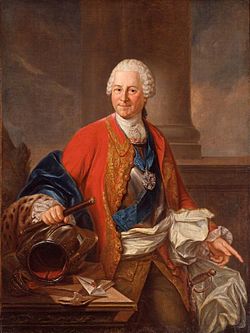Heinrich von Brühl
| Count Heinrich von Brühl |
|
|---|---|
 
Heinrich von Brühl in a Polish costume by Bacciarelli
|
|
| Born |
Heinrich von Brühl 13 August 1700 Gangloffsömmern |
| Died | 28 October 1763 (aged 63) Dresden |
| Nationality | Saxon, Polish |
| Occupation | Diplomat, statesman at the court of Saxony and the Polish–Lithuanian Commonwealth |
| Spouse(s) | Countess Franziska von Kolowrat-Krakowska |
| Parent(s) | Johann Moritz von Brühl |
Heinrich, count von Brühl (Polish: Henryk Brühl, 13 August 1700 – 28 October 1763), was a Polish-Saxon statesman at the court of Saxony and the Polish–Lithuanian Commonwealth and a member of the powerful German von Brühl family. The incumbency of this ambitious politician coincided with the decline of both states. Brühl was a skillful diplomat and cunning strategist, who managed to attain control over of Saxony and Poland, partly by controlling its king, Augustus III, who ultimately could only be accessed through Brühl himself.
Polish historian and writer Józef Ignacy Kraszewski wrote a novel under the title Count Brühl, in which he described Heinrich as an oppressive and stubborn dictator, who, with greed, but also great determination, unsuccessfully attempted to gain control of the entire nation.
It is widely believed that Brühl had Europe's largest collection of watches and military vests; attributed to him was also a vast collection of ceremonial wigs, hats and the largest collection of Meissen porcelain in the world.
Brühl was born in Gangloffsömmern the son of Johann Moritz von Brühl, a noble who held the office of the Oberhofmarschall at the court of Saxe-Weissenfels (ruled by a cadet branch of the Albertine House of Wettin), by his first wife Erdmuth Sophie v. d. Heide. His father was ruined and compelled to part with his family estate, which passed into the hands of the prince. Under Duke Christian of Saxe-Weissenfels von Brühl was first placed as page with the dowager duchess, and was then received at her recommendation into the court of the Electorate of Saxony at Dresden as a Silberpage on 16 April 1719. He rapidly acquired the favour of the Elector Frederick Augustus I of Wettin, surnamed the Strong, who, in 1697, had been elected King of Poland (as Augustus II). Brühl was largely employed in procuring money for his extravagant master. He became Chief Receiver of Taxes and Minister of the Interior of Saxony in 1731.
...
Wikipedia
